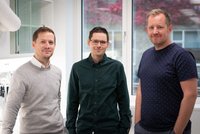- Education
-
Research
Current research
Talent
-
Collaboration
Businesses
Government agencies and institutions
Alumni
-
About AU
Organisation
Job at AU
Researchers have now succeeded in creating the rare and important immune cells, plasmacytoid dendritic cells, in a laboratory. This opens for the possibility of using the cells to treat diseases such as cancer and viral infections within the foreseeable future.
2021.10.13 |

The research groups led by Professor Martin Roelsgaard Jakobsen (right) and Associate Professor Rasmus Bak (left) have now clarified the key conditions needed to develop large numbers of the rare immune cells in a laboratory. Together with former postdoc Anders Laustsen, they have channeled the research into the newly started company UNIKUM Therapeutics, which aims to use pDCs for clinical therapeutic use. Photo: Simon Byrial Fischel
A new study from Aarhus University delivers a significant advancement in stem cell research and the opportunities for treating patients with a new cell-based immunotherapy.
As the first in the world, researchers from the Department of Biomedicine have succeeded in finding a stem cell-based method for developing the rare but important immune cells plasmacytoid dendritic cells (pDCs) under the regulations governing Good Manufacturing Practice (GMP).
pDCs play a central and important role in the immune system as they are able to recognise and fight viral infections. Recent research shows that this type of cell probably also plays an important role in relation to cancer, respiratory infections and autoimmune diseases.
For this reason, pDCs have been a sought-after commodity in the research community, and particularly within cell-based immunotherapy, where they have great potential. However, the fact that very few of these special immune cells can be extracted from the blood has hampered progress.
As Professor Martin Roelsgaard Jakobsen and Associate Professor Rasmus Bak explain, the study has exciting perspectives.
"In collaboration between our two research groups, we’ve developed a GMP cultivation method whereby we’re able to generate millions of pDCs by giving blood stem cells the right nutrients and conditions. Our work opens up the possibility of being able to begin treatment with stem cell-derived pDCs for diseases such as cancer and viral infections within the foreseeable future," says Martin Roelsgaard Jakobsen.
"We know that the pDCs have a crucial role to play in how the body fights diseases such as SARS-CoV-2, and with different types of cancer, we can also see that the presence of pDCs in tumours correlates positively with patient-survival, so there are big perspectives," he explains.
There are less than 0.1 per cent of pDCs in the blood – but it is the cell that produces the most interferon, which is an essential part of the body's immune system. In the study, which has just been published in the journal eLife, the researchers show how they are able to utilise this new method for converting a few hundred thousand blood stem cells into more than 500 million pDCs. By comparison, the researchers would have to use 150 litres of blood to extract the same amount of immune cells.
"We have a repertoire of research projects based on the potent method that we’ve just published. Among other things, we are learning more about the properties, mechanisms, and biological roles of pDCs. Our vision is to be able to give a patient these pDCs in the blood, and briefly get a very potent response that fights the disease," says Associate Professor Rasmus Bak.
"We also have research projects investigating how we can utilise new genetic technology tools such as CRISPR/Cas on the immune cells. We expect to be able to make genetic improvements to the functions of pDCs or give them completely new properties," he says.
The ambition is initially to take pDCs generated from the patient's own stem cells which the researchers will use for treatment.
Progress in cell therapy is one of the great hopes for curing serious and chronic diseases.
In their laboratories, Martin Roelsgaard Jakobsen and Rasmus Bak use stem cells from fully anonymised healthy donors, and the pDCs are created in accordance with the regulations for Good Manufacturing Practice (GMP), which makes it possible to use the method therapeutically.
The research groups also expect their research teams to be ready with a cell therapy product that can be clinically tested within a few years.
"Cell therapy is a form of treatment that will have a huge role to play in the future as we improve our understanding of the interaction between our immune cells and diseased tissue. Here we’ve presented a new type of cell therapy with huge and untapped potential. In principle, there are no limitations in relation to which diseases we can use it on," says Professor Martin Roelsgaard Jakobsen.
Professor Martin Roelsgaard Jakobsen
Department of Biomedicine at Aarhus University
Mobil: +4526153369
Associate Professor Rasmus O. Bak
Department of Biomedicine at Aarhus University
Mobil: +4593929100